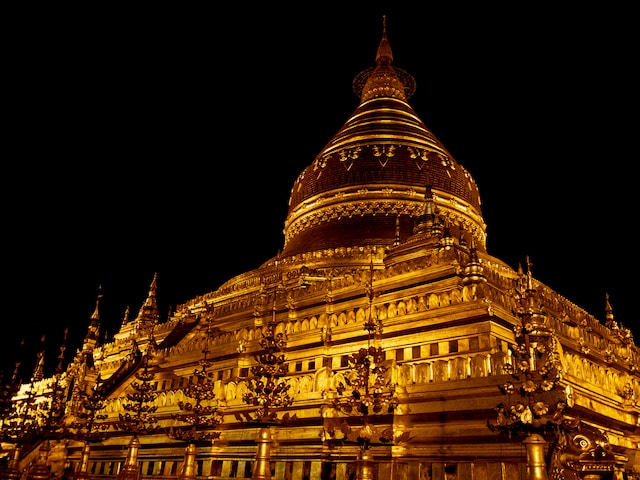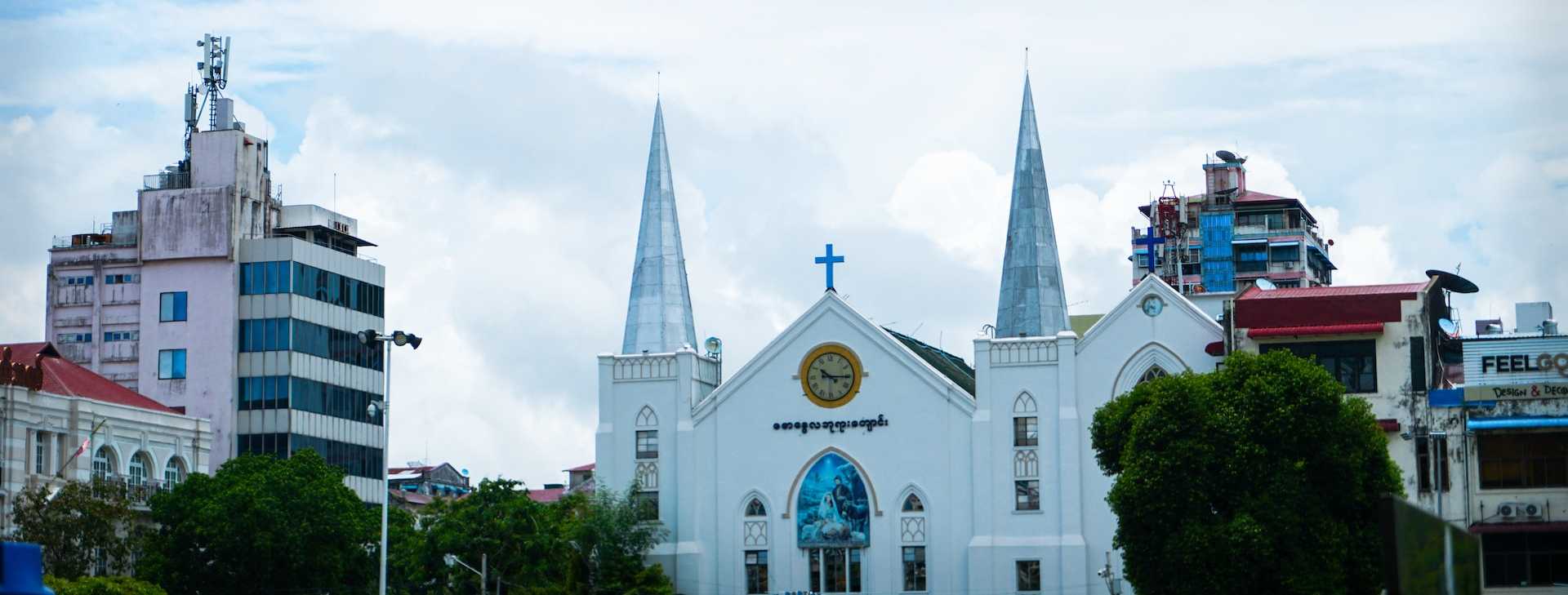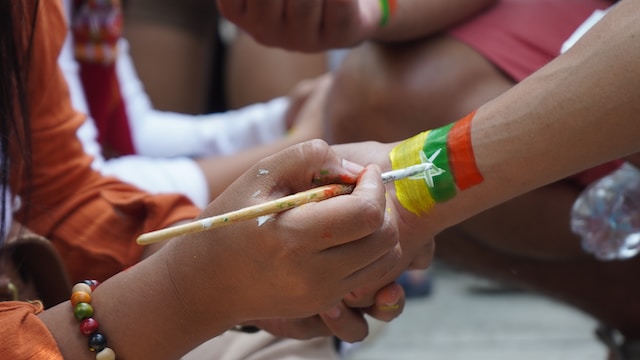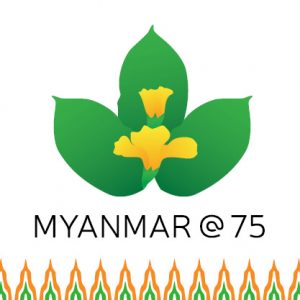 Punk rock is acknowledged globally as the in-the-face, anti-Establishment music genre. Through this moving, first-person, and personal ethnography of Sküm, Burma’s legendary punk rocker, Tobiasz Targosz tells a multi-layered story of Burma’s society, politics, military rule and democracy in recent times, seen with defiance — ‘Infernal Damnation’ (title of this blog) is the title of one of the songs penned by Sküm — to all things wrong, from the margins of society.
Punk rock is acknowledged globally as the in-the-face, anti-Establishment music genre. Through this moving, first-person, and personal ethnography of Sküm, Burma’s legendary punk rocker, Tobiasz Targosz tells a multi-layered story of Burma’s society, politics, military rule and democracy in recent times, seen with defiance — ‘Infernal Damnation’ (title of this blog) is the title of one of the songs penned by Sküm — to all things wrong, from the margins of society.
Political liberalisation in Burma started after the elections of 2012, and ended abruptly in 2021. These years gave the Burmese youth — who had been isolated for decades from the outside world — greater access to the western music scene, and western styles of dress.
In Burma, punk rock music expresses a fundamental tension between those in power and those condemned to subordinate positions and second-class lives; engagement in such alternative music scenes became ‘an invitation of disorderliness’ (Baulch 2007: 30), a defiant rejection of the former regime’s obsession with order. Yangon’s punk scene became both a political tool as well as a coping mechanism to help Burmese youth deal with traumatic experiences of the country’s past and present.
For my research, I decided to focus on the local punk scene in Yangon, driven both by my limited competence in Burmese language, as well as my personal experience of being an active member of the hardcore/punk scene in Poland. This latter experience allowed me to establish contact with Burmese punk easily and enter the fringes of the scene, which is otherwise hermetic, and guided by specific rules and cultural codes.
In this post, through an anthropological presentation of the biography of Sküm (Burmese name: Ko Thet Khine) — an icon of the Burmese punk scene — I want to explore the complex socio-cultural nuances of the punk rock scene in Burma that owes much to its uncertain political climate. It is worth emphasising here that ‘[t]he tacit meanings take longer to learn, and we all recognise that the “old timers” in any scene have a rich stock of knowledge that others do not have.’ (Spradley 1979:156) I believe that an individual who is peculiar and eccentric may be just as good an exemplification of social order as a conformist.
*
I came across the Burmese punk rockers accidentally during my first fieldwork in Burma in 2014; later, in 2016, while I was conducting research about current Burmese political transformations at National Cheng Kung University in Taiwan, I decided to visit Burma again. The music scene was visible everywhere: it had extensive coverage in newspapers, on television, even MTV which aired a documentary about the contemporary Burmese music scene, including a short segment about Yangon’s punk rockers.
This was also the time when political liberalisation in Burma brought with itself the so-called ‘IT revolution’, which meant the widespread use of smartphones, and availability of cheap SIM cards. For the first time in the history of the country, the public had a chance to get limited but universal access to the internet. As a result, many Burmese artists and musicians started using social media platforms like Facebook to promote their art. I sent numerous messages to Burmese punk rock bands and waited impatiently for a reply. To my surprise, the first person who responded to my messages was Sküm, leader of Kultüreshock, a band that had legendary status in Burma. The first message from Sküm, written in fluent English with carefully chosen words that testified to his intelligence and broad knowledge, made me think who this mysterious leader of the most notorious Burmese punk rock band might be?
Almost immediately I wanted to know more about him. Sküm agreed to meet, and give an interview. He received me in his apartment where, apart from a few mats, a laptop, a machete, a baseball bat (‘for self-defence’), a pile of plastic bottles, some CDs, various books in English, and graffiti on the wall (‘Police F**k Off’), there was nothing else.
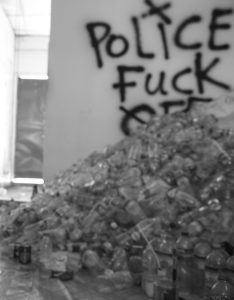
Photo 1: A corner of Sküm’s apartment in Yangon, with plastic bottles and graffiti on the wall, 2016 © For copyright information, please see below.
From outside the window came the sounds of mantras from the neighbouring monastery, broadcast via a megaphone in a screeching and irritating voice. During the interview someone came and started banging loudly on the door; Sküm stayed motionless for a second, gestured me to remain silent, looked me in the eyes, and whispered: ‘In any case, you don’t know me, you are just a tourist who got lost.’ After a few minutes that lasted like an eternity, the banging stopped and we got back to the interview. The tension evaporated in the hot Burmese air.
This first meeting with Sküm made a great impression on me. Over the next few years, we talked often, exchanged observations and thoughts, favourite bands and articles, or books worth reading. We were both fascinated by the writings of anthropologist Kurt Vonnegut and his novel Slaughterhouse-five: Or the Children’s Crusade (1969). Sküm was a person whose attitude towards life, as well as his loudly articulated views, made him the sworn enemy not only of the junta but also of the then quasi-democratic regime in his country. He was never afraid to speak out about the things that hurt him. He believed that
Punk rock is about freedom and speaking up against injustice and the hypocrisies of the establishment.
When he became interested in the persecution of the LGBT community in Burma, he himself started parading in women’s clothes in broad daylight on the streets of Yangon. Needless to say, these and other actions of his won him many enemies in a country dominated by religious and nationalist fervour, where even the so-called National League for Democracy leader and the icon of humanitarianism and democracy, Aung San Suu Kyi, turned out to be a political conformist who, in the name of maintaining power, was willing to enter into an alliance with representatives of the former junta, and kept silent while the Tatmadaw went ahead and slaughtered the Rohingya people. He had a very strong opinion about this fallen so-called ‘democratic’ leader: ‘She’s not a saviour or hero like most people thought … just another lame politician.’ He asked rhetorically: ‘If Daw Aung San Suu Kyi wouldn’t dare to talk about the Rohingya issue then why is she an icon for freedom and democracy?’
*
Sküm was very much aware of what was happening in his country, and was always an outspoken defender of marginalised people living in Burma. On several occasions he expressed concern about the growing popularity of General Min Aung Hlaing, responsible for the Rohingya massacre, in Burma. He often said that he believed that another coup d’état in Burma was inevitable.
From the very beginning of our association, I knew that I had met a remarkable individual. He was something of a spiritual and ideological leader and also the only still-active survivor of the early Burmese punk rock scene. Our interviews were on-and-off for a few years. We chatted over Messenger and via emails. Because of him, for years I remained connected to the situation on the ground in Burma. But I also had someone to talk to, whom I considered a friend. This extraordinary relationship that I had with Sküm reminded me of the words of anthropologist Michael Agar, who once wrote about his informer:
‘Our relationship is an important one; we are I think, as close as “researcher” and “subject” ever get. Among many other things, he highlights an important paradox — it is hard to “do science” with people you like; it is also hard to “do science” with people you do not like; if you do not care one way or the other, it is hard to “do science” because you do not understand enough about people you are doing science with.’ (Agar 1980:18)
*
Sküm was definitely no poster boy. Tortured by years of imprisonment and hard drugs, suffering from HIV and Hepatitis B, he was living on the edge of the law, and outside of society. As a human being, he went through much more than anyone could imagine. Even if he was soft-spoken and well-mannered, there was still this darkness about him that made many Western anthropologists and journalists feel uncomfortable; most felt safer in the company of younger, rebellious, and colourful punk boys and girls involved in humanitarian activities and preaching to anyone who wanted to hear that their ‘Buddha is a punk’. Sküm, on the other hand, never hid his disdain for any form of organised religion and government. He was like a stone thrown in the face of a Tatmadaw soldier, like a stick stuck in the gears of a Burmese death machine and conservative religious fanaticism. He embodied the tragic and tumultuous history of his country. His body, covered with a dense network of tattoos, was a testament to his rebellion against the regime he had grown up with, which had imprisoned him for six years and which he deeply hated.
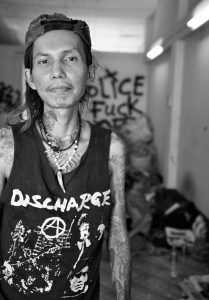
Photo 2: Sküm in his apartment in Yangon, 2016 © For copyright information, please see below.
Despite the respect he enjoyed in the local punk scene, Sküm was ill-suited to be the subject of touching Western accounts of Burmese punk. He was uncompromising, fearless, provocative, full of irony and sarcasm, and honest to the core. He was also allergic to posers, careerists and all kinds of wannabes. After the landslide victory of Aung San Suu Kyi in the elections of 2015, this well-read and fluent in idiomatic English free-thinker and non-mainstream intellectual was not willing to fit into the narrative about his country created to cater to the needs of the Western media and academy, in which the victory of democracy and freedom was widely celebrated. He never posed as a hero, even if he was never afraid to speak the truth in a country where doing so was a crime.
About his early childhood, Sküm told me that his mother was a very religious and conservative school teacher; she was very demanding, and wanted to control him. He once said: ‘what my mom taught me was to conform to the system and obey the authority.’ His father had died in a plane crash when he was just six years old; about a month later, his brother died in a car accident. Unsurprisingly, Sküm’s family found themselves in a difficult financial situation.
Sküm could not cope with this stroke of fate. At school, he was always one of the best students. However, he was also very defiant and did a lot of things that upset his mother. As a half orphan he got bullied a lot, but he never complained about it. Turbulent events from Burmese contemporary history also had a huge impact on him: ‘I did have the chance to witness some of the most important historical events through my life but in 1988, I was only eight years old, so I hadn’t been actively involved in any of the protests though I’d heard enough gunshots at night and news about the brutal massacres of peaceful protestors by the military from older family members and neighbours.’
*
Sküm started listening to music when he was 10 years old, as a way of escaping from the grim reality that he lived in. Pretty soon, as an act of defiance, he started to tattoo his body extensively:
My first tattoo was the “Misfits” logo. It was also something very rebellious. We live in a country where only traditional and ethnic tattoos are relatively socially acceptable. Barbed wire is a souvenir from High School, I was 13. I also have a “Discharge” tattoo that I made myself.
As a teenager, he became a full-time punk rocker which was a risky thing to do at that time. In an interview with ‘Unite Asia’, he elaborated on those early years of Burmese punk rock scene:
‘The hardships of being a punk here in Myanmar was far worse in the ’90s, so the kids who’re only familiar with the scene here in the ’00s have no clue what it’s like to be truly oppressed. Back in those days, it was common for punks to get arrested on the streets without breaking any laws …. I have seen friends forcibly get their heads shaved and thrown into jail for no reason. Even the everyday “normal” citizens liked to pick on punks and beat the shit out of them for what they considered “weird” attire […] This was an age where you could literally get beaten to death on the streets for just being a punk. I’m glad the younger generation of punks don’t have to suffer through what we did.’
After graduating from high school, he started to study at the Yangon University of Foreign Languages, an institution known to the government for breeding many pro-democracy activists. During that time (in 2003) he managed to form the first Burmese hardcore punk band called ‘Diehards’. The junta considered punk rock as a textbook example of decadent Western culture that was a threat to traditional Burmese identity. Pretty soon Sküm’s angry lyrics criticising the military government made him public enemy Number One. The band played only a few gigs and split up after he got arrested for possession of marijuana. It all happened just before his final examinations at the university. As he commented later on in an interview: ‘They were using the fact that I was doing drugs, so when they no longer wanted me on the street, they arrested me.’
In totalitarian countries like Burma, playing independent music was considered an anti-government political stance. Putting Sküm behind bars was a way of setting an example for the younger generation who looked up to him. He was initially imprisoned for 12 years in prison but following an appeal, his sentence was reduced to 8 years. In the end, as he said himself: ‘I only had to stay in prison for 6 years, three of which were in the notorious Insein Central Prison and three years in a labour camp outside Yangon.’ His friend, who was arrested with him, died in prison.
In 2016, during an interview with me, he commented on life in prison: ‘I had been to prison several times in my life and spent a long time there. Now those times seemed to me like a long, f**kin’ nightmare consisting of corruption, prison fights, rules-breakings, acts of violence, punishments, injustice, bullying, deaths, scheming, power struggles, sufferings, diseases, betrayals, and so many back-stabbings. Sometimes I even wonder how I came to manage to survive at all, considering my volatile personality and the many enemies I’d earned myself during my time in prison. I feel somehow relieved to learn that now the living conditions and food are far better and many things have improved in the prison system of our country although I’m totally aware that it’s way below international standards. But things were far worse while I was there. I’d seen many sick people die from lack of proper medication, and inmates beaten the shit out of their arses by wardens and prison officers every day. It’s far worse than Western people imagine except for those unlucky few who had ended up in notorious Burmese prisons then. But to tell you the truth, I didn’t have to suffer like the majority of poor, voiceless inmates for I could afford the considerable amount of bribery to get myself out of trouble for occasional rules-breakings and confrontations with the wardens as well as the fellow inmates, and also because I had so many friends in prison, which I’m still having now. And as I openly refused to work in prison by pointing out the briberies involving the prison officers and their own rules-breakings, my daily routine was not as harsh as the average inmate who couldn’t offer bribery and had no guts to take a stand against the corrupt authority. Most of my time there was spent on reading, designing, and doing a shitload of prison tattoos on myself and others, cooking, and getting high on drugs whenever I got a chance. Obviously, I had never been an ideal, rules-abiding inmate once during my stay behind bars.’
In prison, he contracted HIV and Hepatitis B, which took its toll on him. In 2007, when the Saffron Revolution began, he was already in prison. He didn’t have a clue what was happening outside except for a few rumours: ‘I only had to learn everything later from those monks and people the government had thrown behind bars for taking part in that movement. By the time of Cyclone Nargis (2008), I was at a prison labour camp outside Yangon, which was closely located to the most seriously affected areas by the Cyclone and I still remember all the death and destruction wrought upon Burmese rural surroundings by the merciless Nargis.’
In 2009, just after he was released from prison, he formed ‘Kultüreshock’, his most well-recognised musical project. As leader of this band, Sküm got to know himself again as the outspoken and ferocious critic of the Burmese government. His lyrics were directly and openly addressing some of the most controversial issues of the time like the rise of Buddhist fundamentalism, human rights abuses, neo-fascism, civil war, social injustice, homophobia, sexism, and the rising unemployment rate. He was not afraid to speak out. According to Sküm, Burmese punk rock acted as the very antithesis of broader and commonly accepted mainstream Burmese culture saturated with nationalism, chauvinism and religious fanatism. He considered punk rock as
the way to my personal liberation as well as the weapon to oppose the system we’ve grown to hate and despise so much at the same time.
Sküm also managed to introduce DIY mentality into the Burmese punk rock scene which proved to become a crucial part of it.
He often shared his distrust of the NLD government and the quasi-democratic transition in Burma. During one of our conversations, he said: ‘The new government does exactly the same as the military juntas. Today’s Burma is a nation of sheep, ruled by wolves, owned by pigs.’ He elaborated on it at length in an interview he gave to MTV: ‘My whole generation was repressed by the government. You end up feeling hatred toward everything you see. The government has a two-sided policy. On one side they undertake some reforms, relax some rules, make some promises, make some changes but it is not an unconditional move to freedom. At the same time, they show signs of backtracking, so the reform is not moving ahead but stuck midway.’
As early as 2017 he felt that the political situation in Burma was at a stalemate and he wasn’t hoping much for the future. He openly criticised the 969 Movement; his personal opinion about them was: ‘It’s plainly nothing but a conspiracy between the xenophobic fake monks who lust for fame and power, former members of the notorious military intelligence who’re fired and kicked into prison during the power struggle between the juntas and Burmese-chauvinist political scums who’re waiting for opportunities to drive the country back into totalitarianism.’ In one of his songs he also commented on the so-called NLD ‘peace process’ as: ‘A peace dove with blood-stained feathers.’ This line would stick in my head forever.
In January 2018, our communications suddenly stopped. It took me over a month to get to know that Sküm had been imprisoned in Insein Prison. Through friends I managed to send him some money to help him survive the harsh reality of prison life. Everyone close to him were very aware that his physical condition was deteriorating. Pretty soon he ended up in the prison hospital. However, after he got released in 2019, in one of the first messages he sent me he wrote:
Don’t worry, I’m stronger than most people think. Prison’s a f**kin’ piece of cake for me.
I also learnt that the money we sent never reached him. His mother donated all of it to a Buddhist monastery for constructing new buildings, of course, all in his name. He was mad and infuriated, as he told me he would prefer to spend the money on ‘feeding and helping so many poor, starving and homeless have-nots here in this country!’
Sküm fiercely believed that someone needs to speak up about all the atrocities happening in his country; he wanted be a voice of the speechless. He never bowed his head to any authority, he always stood up for himself and others, and remained fearless. As he said in one of the interviews: ‘Right now we are nobody, but if we keep trying, keep fighting, hopefully, there will be a difference in the future.’
Sküm passed in October 2020. His death came as a surprise; it was too early and not too imminent. The last time we talked he seemed to be happy and at ease. He told me that we will talk later on. But his body proved to be weaker than his mind and will. His life was full of struggle and painful experiences directly connected to turbulent political events in Burma, as he wrote in one of his songs:
The spiritless man who survives in this surreal world walks the endless dream roads of the insane.
I was devastated after hearing news of his death. It took me a long time to get back to feeling my senses; it was a very dark period for me. When I finally started to feel a bit better, another shocking news (the coup d’état, in February 2021) arrived. Like many other people who were professionally and personally involved with Burma, for the next few weeks I struggled with even basic activities like getting out of bed and going to work, even though I lived far away. I suffered from severe depression for months. I tried desperately to get in touch with my Burmese friends only to learn that some were already dead, others were hiding in jungles and organising guerrillas or had fled to refugee camps in Thailand. The bloody aftermath of the coup during which army troops opened fire on peaceful protesters has burned a black hole in my heart. People close to me got imprisoned, tortured and killed; I felt completely hopeless, and was unable to help them. I managed to complete my doctoral research, but the tragedy that was unfolding in Burma was on my mind all the time.
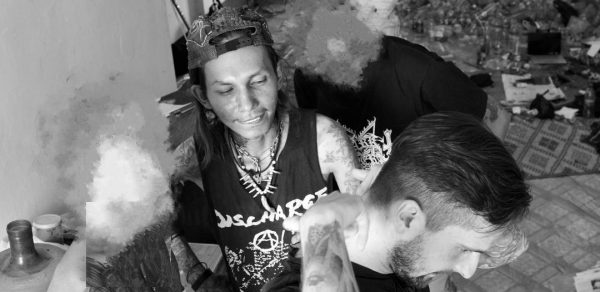
Photo 3: The author showing his tattoos to Sküm in his apartment in Yangon, 2016 © For copyright information, please see below.
Sküm managed to influence the lives of many people, including mine. His wit, sense of humour, well-rounded personality, impressive intelligence and wisdom made him a fascinating person to talk with and be around. He had this natural charisma and magnetism that won people over to him. Sküm’s life was a cry for freedom in a country enslaved for decades by a military dictatorship. Through this post marking the 75th anniversary of Burma’s independence, I want to thank him for his friendship and bravery: You did your job comrade, I pay respect to you brother, and to all people in Burma who fight an unequal, long-lasting and brutal war with the military junta. Until we see each other again, my friend!
*
The views expressed here are those of the author and not of the ‘South Asia at LSE’ blog, the LSE South Asia Centre or the London School of Economics and Political Science. Please click here for our Comments Policy.
This blogpost may not be reposted by anyone without prior written consent of LSE South Asia Centre; please e-mail southasia@lse.ac.uk for permission.
Author’s Acknowledgements: I would like to express my gratitude to Darko from ‘Side Effect’, Lukas Frohofer and Pyae Sone Aung from ‘Kultüreshock’, and Carolin Hirsch and Riz Farooqi from ‘Unite Asia’.
Photographs © Arkadiusz Fudali; all photographs edited and used with permission of the author; no photograph may be used/reproduced without written permission of the author.
Banner image © Arkadiusz Fudali, Sküm and the author in Sküm’s apartment, Yangon, 2016.
The ‘Myanmar @ 75’ logo is copyrighted by the LSE South Asia Centre, and may not be used by anyone for any purpose. It shows the national flower of Myanmar, Padauk (Pterocarpus macrocarpus), framed in a design adapted from Burmese ikat textile weaves. The logo has been designed by Oroon Das.
*



